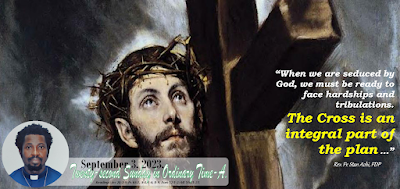THE POWER OF SEDUCTION.
September 3, 2023.
Twenty-second Sunday in Ordinary Time – A.
A French proverb says: “Example is the greatest of all
seducers.” And a Spanish proverb adds: “The snake that seduced Eve spoke
Spanish.”
Seduction is itself an art. It displays to someone the
beautiful side of something. But when you take time to look deep inside, it
does not hide what it requires to fully possess or live that thing, that is the
sacrifices that go with it. We hear and speak most of seduction in relationship
with love. And in that sense, women are the experts. I read somewhere that
seduction is a game of psychology, not beauty. Seducers see themselves as
providers of pleasure. When one seduces you, they seem to offer you the most
happy and greatest moments of life. But once you fall into it, you discover
what true happiness is about. It does not take away crosses and hardships but
transforms them into means of personal fulfillment.
Why are we speaking about seduction and its power today?
Simply because the readings lead us to it. In the first reading, we hear the
Prophet Jeremiah complaining that God seduced him. Like everyone who falls into
the trap of seduction, Jeremiah was convinced that answering God's call would
lead him to success and an easy life. That was a dream or an expectation. The
reality was different.
Life won't be as fair as he thought. The Prophet will go
from mockery to insults, rejection to maltreatment. In his own words, we hear:
"All the day I am an object of laughter; everyone mocks me. Whenever I
speak, I must cry out, violence and outrage is my message; the word of the LORD
has brought me derision and reproach all the day." The fact is, he cannot
subtract himself from being a prophet. His heart is fully caught by God and
burning out for him and his word. Therefore, the Prophet will resolve to carry
his mission, no matter what it might cost him.
In the Gospel, we have something quite similar. After Peter
confessed Jesus as the Messiah, the Son of the living God, the Lord started
revealing the contents of his Messianism, the Passion and Death he will
undertake, and his future Resurrection. But this does not meet the expectations
and agenda of Peter. Why does the Messiah have to suffer? Peter was seduced by
the image of glory. Suffering was not part of the plan. So, we read that he
tried to rebuke Jesus: “God forbid, Lord! No such thing shall ever happen to
you.” But Jesus will rebuke him the more: “Get behind me, Satan! You are an
obstacle to me. You are thinking not as God does, but as human beings do.” As
to say, suffering is not an addition, it is rather part and the central element
of the plan of salvation. When we are seduced by God, we must be ready to face
hardships and tribulations. The Cross is an integral part of the plan.
It is not an intrusive thing. The Christian life cannot be
conjugated without the cross. It is rather at the feet of the Cross we give the
genuine witness of our faith and belonging to Christ. For, he says: “Whoever
wishes to come after me must deny himself, take up his cross, and follow
me..." Who is unwilling or not ready to carry the cross with Jesus and
walk after him on the roads of tribulations, humiliation, rejection, and even
martyrdom is not a true disciple of Christ. Many are they, unfortunately, the
nominal Christians who love Christ but hate his cross. Their favorite Gospels
are the Gospel of miracles, healing, multiplication of bread, and walking in
the sea without waves or winds. When come the winds, waves, and any other
tribulations, they lose hope, and some even depart from him.
Jesus did not come to promise fortune or earthly
possessions. He came to bring us salvation. And this salvation will be
effective only on the Cross, in his blood, through his death. As his disciples,
not only should we accept and believe this fact, but we also should be ready to
walk in his footsteps, that is carry our crosses after him. The Lord warns us
questioning: "What profit would there be for one to gain the whole world
and forfeit his life? Or what can one give in exchange for his life?"
To close our meditation, what should be our relation or
attitude toward riches and material possessions? Many people state that the
Church promotes poverty and hatred of riches and material. That is far from
being true. The Church does not teach that material possession is evil. She
only warns about the use or the place we give to it in our lives. Evil is what
we make of our possessions and how we relate to them. In the Holy Scriptures,
“the Lord grieves over the rich, because they find their consolation in the
abundance of goods. "Let the proud seek and love earthly kingdoms, but
blessed are the poor in spirit for theirs is the Kingdom of heaven."
Abandonment to the providence of the Father in heaven frees us from anxiety
about tomorrow. Trust in God is a preparation for the blessedness of the poor.
They shall see God.” CCC 2547





Comments
Post a Comment